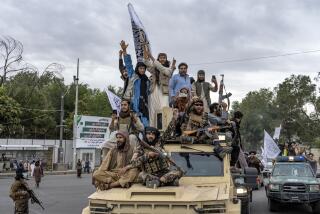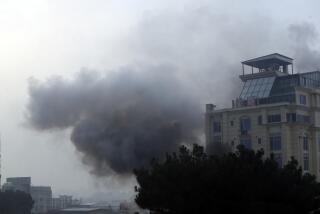Taliban attacks Kabul guesthouse, presses raid on Afghan base
- Share via
Reporting from Kabul, Afghanistan — Taliban militants raided a guesthouse used by foreigners in Kabul on Saturday after besieging an army base in the south in an escalating campaign of violence as NATO troops withdraw from Afghanistan.
At least five Afghan soldiers were killed and nine injured in the attack on the army base in Helmand province, which began Thursday evening when dozens of Taliban-allied fighters, including suicide bombers, stormed the compound. The base, formerly known as Camp Bastion, was used by British forces and U.S. Marines before it was handed over to Afghan control last month.
Provincial officials in Helmand said 20 Taliban fighters were killed in the attack, including six suicide bombers who detonated their explosives in order to gain entrance to the facility.
Then, Saturday afternoon, Taliban militants engaged in a nearly four-hour gun battle with security forces at a building in western Kabul housing members of a foreign organization that Afghan officials did not name. Two staff members, including one foreigner, were killed and six others were trapped inside the compound but later rescued, said Gen. Ayoub Salangi, the deputy interior minister.
The Taliban in a statement claimed the attack began with a car bomb and that the building was used by Christian missionaries who were attempting to convert Afghans. Earlier this year, the group attacked another compound in the same neighborhood that it said was being used by missionaries, but turned out to be a guesthouse for the American relief organization Roots of Peace.
Three Taliban militants were killed in the attack. Some people inside the compound were wounded and were being treated at nearby hospitals, according to Kabul police officials, who said some of those rescued were children.
The attacks were a latest in a string of suicide bombings and major violence throughout Afghanistan in recent weeks. Analysts say the Taliban, who have claimed responsibility for many of the assaults, are mounting a challenge to the new government of President Ashraf Ghani, which has signed security agreements with the United States and NATO to keep about 12,000 foreign troops in Afghanistan after December, when international combat troops complete their withdrawal.
The attacks have included a bombing at a mosque in eastern Afghanistan during prayers on Friday that injured at least 31 worshipers, including the mullah leading leading the service, and an explosion that targeted a British Embassy vehicle in Kabul and killed six people, including a British security contractor.
The uptick in violence is one of the longest and deadliest in recent months and comes just days before a conference in London at which the United States and other Western countries were hoping to mark the end of the NATO combat mission and give their backing to Ghani’s government.
Residents of Nangarhar province, site of the mosque bombing, said security has deteriorated since Ghani took office two months ago following a disputed election. No group has claimed responsibility for the attack, although suspicion immediately fell on the Taliban and allied militant groups.
“It seems like the Taliban are out to show their strength to the new administration,” said Abdul-Rahim Saraf, a 40-year-old resident of the province’s Khogyani district, a longtime Taliban stronghold. “We have always had security issues here, but never have we seen something like this, where a mosque is targeted, especially during Friday prayers.”
The Taliban have vocally opposed the security agreements with the United States and NATO, calling them an affront to the “dignity, honor, Islamic values and the uncompromising spirit of freedom” of Afghanistan. The Afghan parliament last week ratified the accords, which provide for continued security cooperation between the United States and Afghanistan and could pave the way for a resumption of joint U.S.-Afghan nighttime raids against Taliban suspects, a controversial practice that former President Hamid Karzai halted because of allegations of civilian casualties.
Saraf said he, like many residents of Khogyani, opposed the security agreements, which he maintained would only lead to further violence.
“The foreigners have been here for the last 13 years and nothing has changed,” he said. “Khogyani is still unsafe and our lives are no better, so I don’t see what the reason for signing it was.”
Special correspondent Latifi reported from Kabul and staff writer Bengali from Mumbai, India.
Follow @SBengali on Twitter for news out of South Asia
More to Read
Sign up for Essential California
The most important California stories and recommendations in your inbox every morning.
You may occasionally receive promotional content from the Los Angeles Times.











